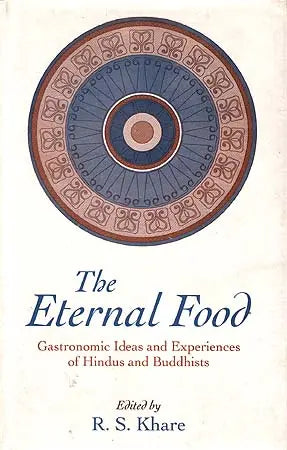The Eternal Food: Gastronomic Ideas and Experiences of Hindus and Buddhists
The Eternal Food: Gastronomic Ideas and Experiences of Hindus and Buddhists is backordered and will ship as soon as it is back in stock.
Couldn't load pickup availability
Genuine Products Guarantee
Genuine Products Guarantee
We guarantee 100% genuine products, and if proven otherwise, we will compensate you with 10 times the product's cost.
Delivery and Shipping
Delivery and Shipping
Products are generally ready for dispatch within 1 day and typically reach you in 3 to 5 days.
Book Details:
-
Author: Edited by R.S. Khare
-
Publisher: Sri Satguru Publications
-
Language: English
-
Edition: 1993
-
ISBN: 8170303656
-
Pages: 287
-
Cover: Hardcover
-
Dimensions: 22.5 cm x 14 cm
-
Weight: 450 gm
Book Description:
Preface:
This book explores how Indic cultures, particularly Hindu and Buddhist traditions, view food as both an "essence" and an integral experience within personal and social life. Rather than focusing on the empirical diversity of food and culinary habits, it emphasizes the cultural, philosophical, and aesthetic dimensions of food in the subcontinent. The contributions reflect the long-standing shared food cultures within Hindu and Sinhalese communities, illustrating the cosmological, moral, social, and material qualities of food.
Food in Hinduism, for instance, is more than just a physical necessity. It is seen as an essential expression of the ultimate reality, transcending social and religious distinctions such as caste, gender, or age. This book delves into how food is intertwined with the spiritual and moral ideals of Hindu life, serving as a tool for testing one's ability to live in accordance with these ideals. The book is a thorough exploration of the symbolism of food in Indian civilization, offering valuable insights into its deep, multi-layered meanings.
Introduction:
The papers in this volume investigate the multifaceted role food plays in India and Sri Lanka, with a particular focus on its cultural, religious, and philosophical significance. The discussion goes beyond food as a material substance and highlights its symbolic and spiritual roles in the lives of individuals and communities.
Food in India is not just a commodity; it embodies essential cultural and moral values. The volume emphasizes the complex ways in which food intersects with caste, health, emotions, personal dispositions, and spiritual practices. It is a semiotic marker that not only reflects but also shapes the social fabric of Indian society. The papers also explore food as a lens to understand the distinction between ideal and practical realities, between the abstract and the concrete.
From the Jacket:
The interdisciplinary approach presented in this book examines food in religious, literary, and cultural contexts in India and Sri Lanka. The authors focus on food's symbolic and experiential role, paying particular attention to Hindu saints for whom food represents a divine principle, both cosmic and immediate.
Food in India is deeply embedded in social structures, shaping people's caste, health, and even their spiritual progress. Through a combination of religious, philosophical, and social lenses, the book reveals the complex ways in which food is used to communicate moral and spiritual values, both at the personal and collective levels.
The authors demonstrate how food functions as a key cultural marker in India, touching on its role in health, social status, and spiritual development. This book provides a profound exploration of how food shapes and reflects the essence and experiences of life in India.
About the Author:
R.S. Khare is a Professor of Anthropology and Chairman of the International Commission on Anthropology of Food at the University of Virginia. He has made significant contributions to the study of food cultures and their anthropological implications, particularly in the South Asian context.





